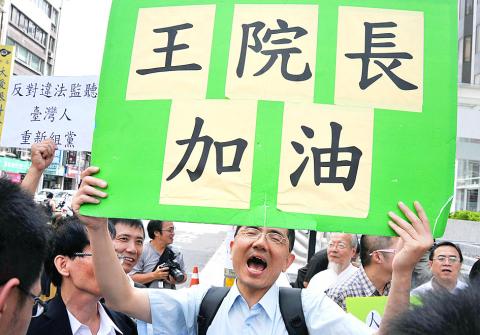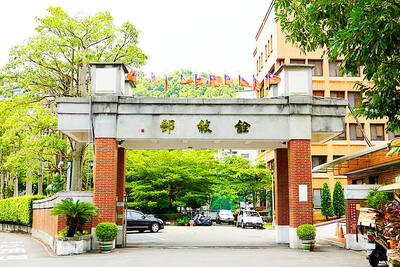Branding himself a Chinese Nationalist Party (KMT) member “forever and ever,” Legislative Speaker Wang Jin-pyng (王金平) yesterday took legal action as he sought to invalidate a party ruling that revoked his membership.
The 72-year-old Wang, who has served as a lawmaker since he was 34, said he was “sad” about the decision because the KMT was like a “mother” to him, but added that he was facing the situation “calmly.”
Wang, a KMT legislator-at-large, has vowed to appeal to retain his membership, which, if revoked, will force him to forfeit his post as a lawmaker.

Photo: Mandy Cheng / AFP
The KMT’s Central Evaluation and Discipline Committee yesterday withdrew Wang’s membership over his alleged involvement in illegally lobbying on behalf of Democratic Progressive Party (DPP) legislative caucus whip Ker Chien-ming (柯建銘) in a legal case.
Wang denies any wrongdoing.
A few hours after the decision was made, the committee promptly delivered the document to the Central Election Commission (CEC) in order to invoke the necessary procedures to nullify Wang’s membership.
After receiving the notice, the election commission sent a letter to the legislature, as required by Article 73 of the Civil Servants Election and Recall Act (公職人員選舉罷免法), in the evening to ask it to revoke Wang’s status as a lawmaker, CEC Vice Chairman Liu I-chou (劉義周) said.
The act does not specify how long the legislature will take to complete the procedure, but the CEC said it would name a KMT legislator-at-large to replace Wang within 15 days of receiving the legislature’s reply, Liu said.
Wang yesterday offered an apology to the public, saying he was sorry that former minister of justice Tseng Yung-fu (曾勇夫) resigned over the incident and for the disturbances caused to society.
However, he also acted quickly to defend his standing in the party.
Former DPP lawmaker and attorney Chiu Tai-san (邱太三) filed an injunction against the revocation with the Taipei District Court, as well as a civil lawsuit seeking to overrule the KMT’s decision.
Chiu said that submitting an appeal to the KMT alone was not sufficient to prevent the party from rescinding Wang’s membership and suggested that the legislative speaker seek other judicial means to avoid irreparably damaging his legal rights.
Wang said he was considering bringing a civil lawsuit against the KMT to reverse the decision to revoke his membership.
Chiu said that former KMT lawmaker Hsu Shu-po (許舒博), who was expelled by the party because of his involvement in a legal case, had filed an injunction against the party and had his membership reinstated in 2011.
The decision to rescind Wang’s membership has aroused anger among several KMT members.
In Greater Kaohsiung, Wang’s hometown, 11 KMT borough wardens withdrew from the party to voice their discontent with his ejection.
KMT Legislator Chen Ken-te (陳根德) said the party was doomed to fail in future elections because by expelling Wang — who is favored by KMT pro-localization factions — it had shown that President Ma Ying-jeou (馬英九) was eager to distance the party from pro-localization forces.
Former Taipei EasyCard Corp (悠遊卡公司) chairman Sean Lien (連勝文), the eldest son of former KMT chairman Lien Chan (連戰), paid a visit to Wang in his legislative office, saying that whether the speaker was guilty in the influence-peddling case should be decided by a court, not a handful of people — an apparent reference to the KMT disciplinary committee.
“We are living in the 102th year of the Republic of China, not in the Ming Dynasty. No one in the country is above the law,” Sean Lien said.
His comments appeared to be a reference to a Ming-era intelligence unit known as Dong Chang (東廠), which had the power to spy on court officials, the gentry, academics and the army, and reported directly to the emperor. The unit could also arrest and interrogate such people if authorized to do so by the emperor.
Additional reporting by Jake Chung

Taiwan Semiconductor Manufacturing Co (TSMC, 台積電) is expected to start construction of its 1.4-nanometer chip manufacturing facilities at the Central Taiwan Science Park (CTSP, 中部科學園區) as early as October, the Chinese-language Liberty Times (the Taipei Times’ sister newspaper) reported yesterday, citing the park administration. TSMC acquired land for the second phase of the park’s expansion in Taichung in June. Large cement, construction and facility engineering companies in central Taiwan have reportedly been receiving bids for TSMC-related projects, the report said. Supply-chain firms estimated that the business opportunities for engineering, equipment and materials supply, and back-end packaging and testing could reach as high as

CHAMPIONS: President Lai congratulated the players’ outstanding performance, cheering them for marking a new milestone in the nation’s baseball history Taiwan on Sunday won their first Little League Baseball World Series (LLBWS) title in 29 years, as Taipei’s Dong Yuan Elementary School defeated a team from Las Vegas 7-0 in the championship game in South Williamsport, Pennsylvania. It was Taiwan’s first championship in the annual tournament since 1996, ending a nearly three-decade drought. “It has been a very long time ... and we finally made it,” Taiwan manager Lai Min-nan (賴敏男) said after the game. Lai said he last managed a Dong Yuan team in at the South Williamsport in 2015, when they were eliminated after four games. “There is

Democratic nations should refrain from attending China’s upcoming large-scale military parade, which Beijing could use to sow discord among democracies, Mainland Affairs Council Deputy Minister Shen You-chung (沈有忠) said. China is scheduled to stage the parade on Wednesday next week to mark the 80th anniversary of Japan’s surrender in World War II. The event is expected to mobilize tens of thousands of participants and prominently showcase China’s military hardware. Speaking at a symposium in Taichung on Thursday, Shen said that Chinese Minister of Foreign Affairs Wang Yi (王毅) recently met with Indian Prime Minister Narendra Modi during a visit to New Delhi.

FINANCES: The KMT plan to halt pension cuts could bankrupt the pension fund years earlier, undermining intergenerational fairness, a Ministry of Civil Service report said The Chinese Nationalist Party (KMT) caucus’ proposal to amend the law to halt pension cuts for civil servants, teachers and military personnel could accelerate the depletion of the Public Service Pension Fund by four to five years, a Ministry of Civil Service report said. Legislative Speaker Han Kuo-yu (韓國瑜) on Aug. 14 said that the Act Governing Civil Servants’ Retirement, Discharge and Pensions (公務人員退休資遣撫卹法) should be amended, adding that changes could begin as soon as after Saturday’s recall and referendum. In a written report to the Legislative Yuan, the ministry said that the fund already faces a severe imbalance between revenue